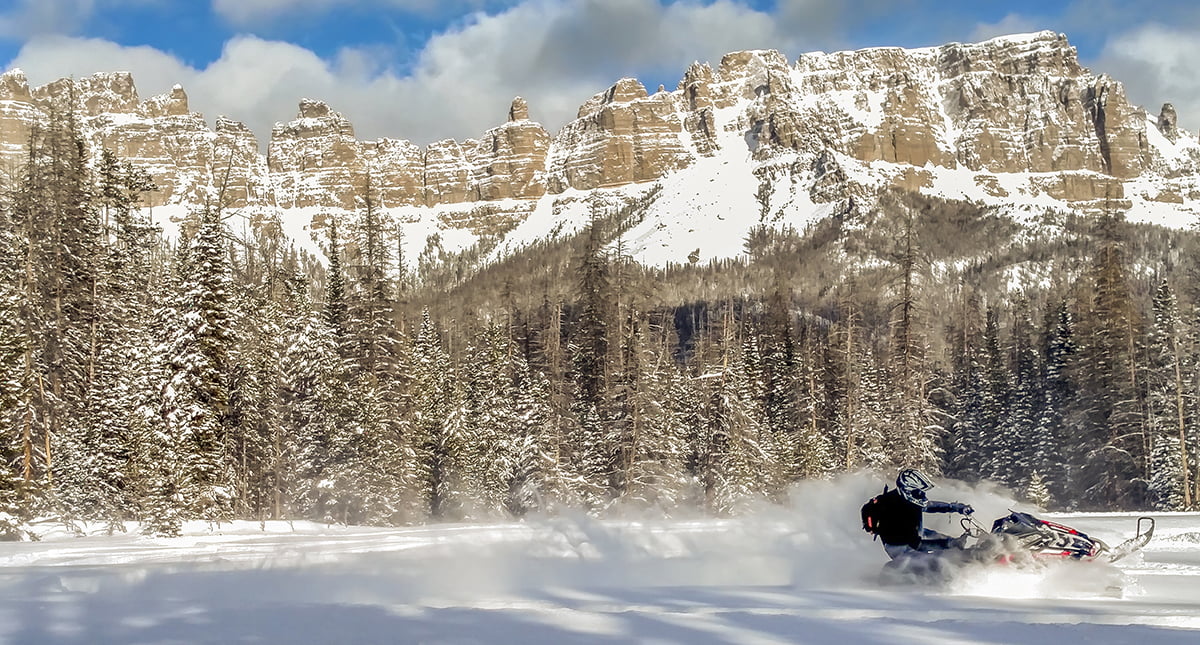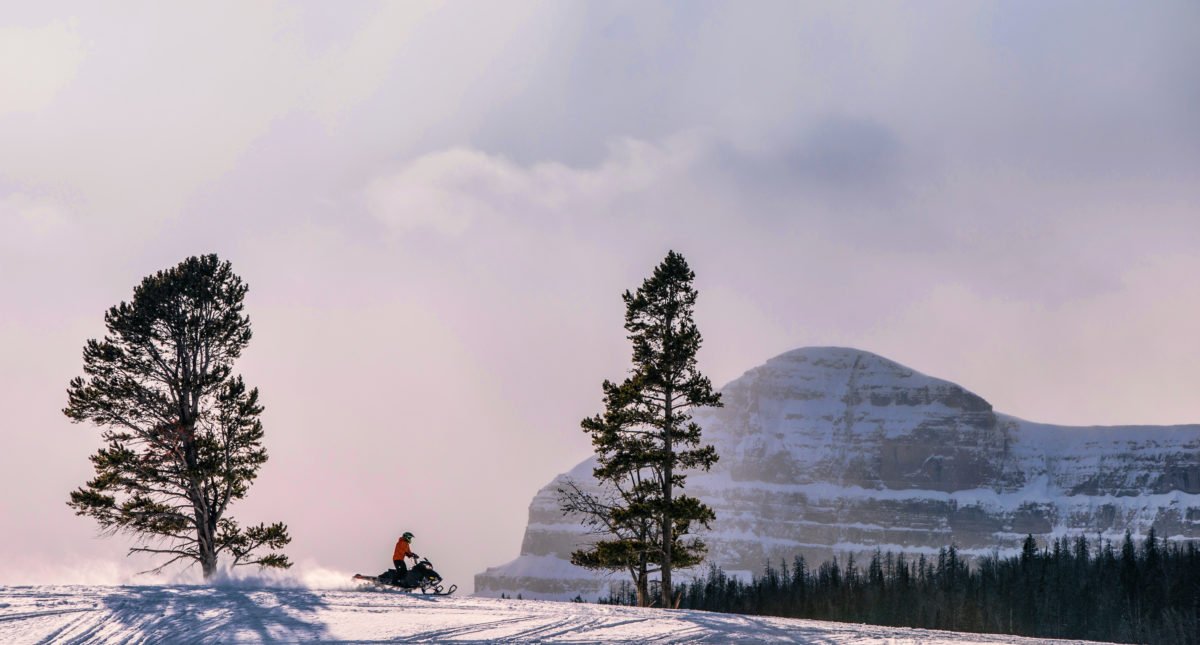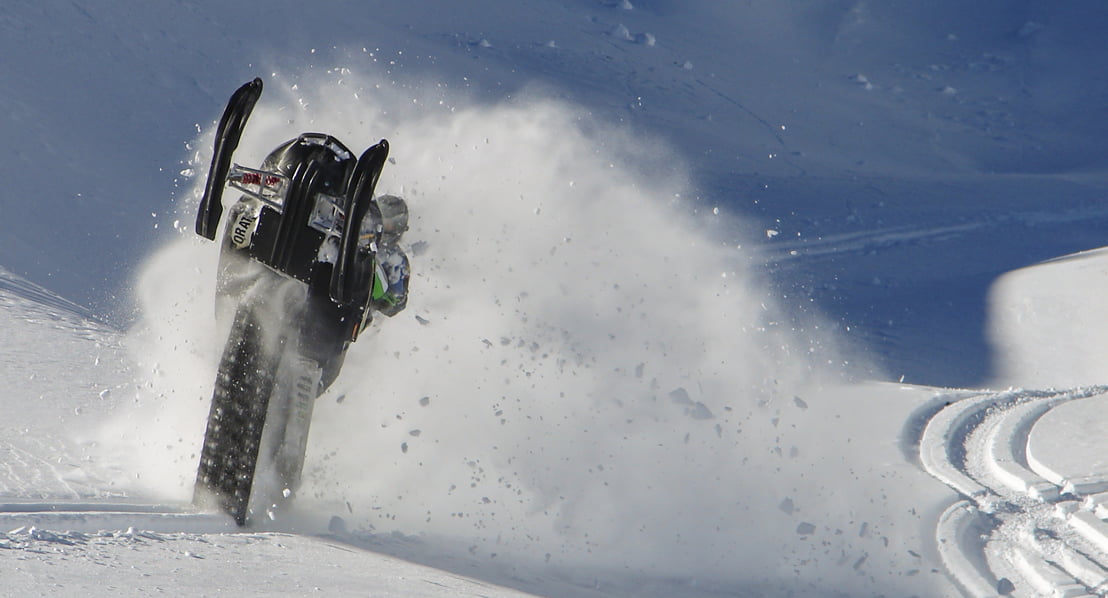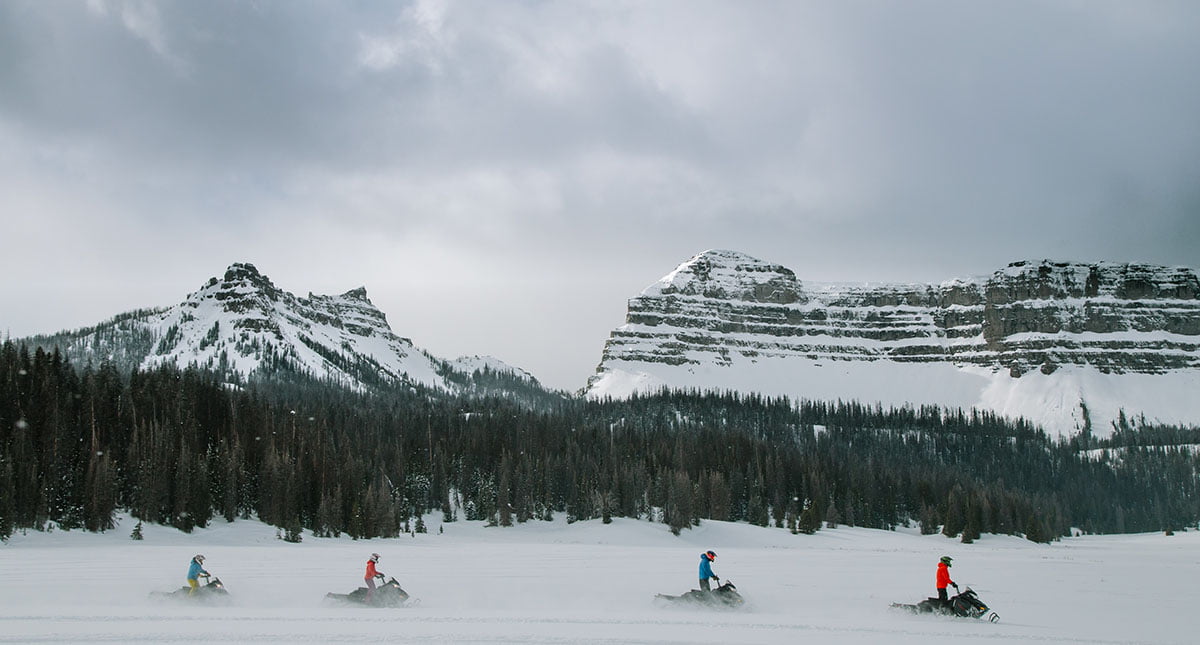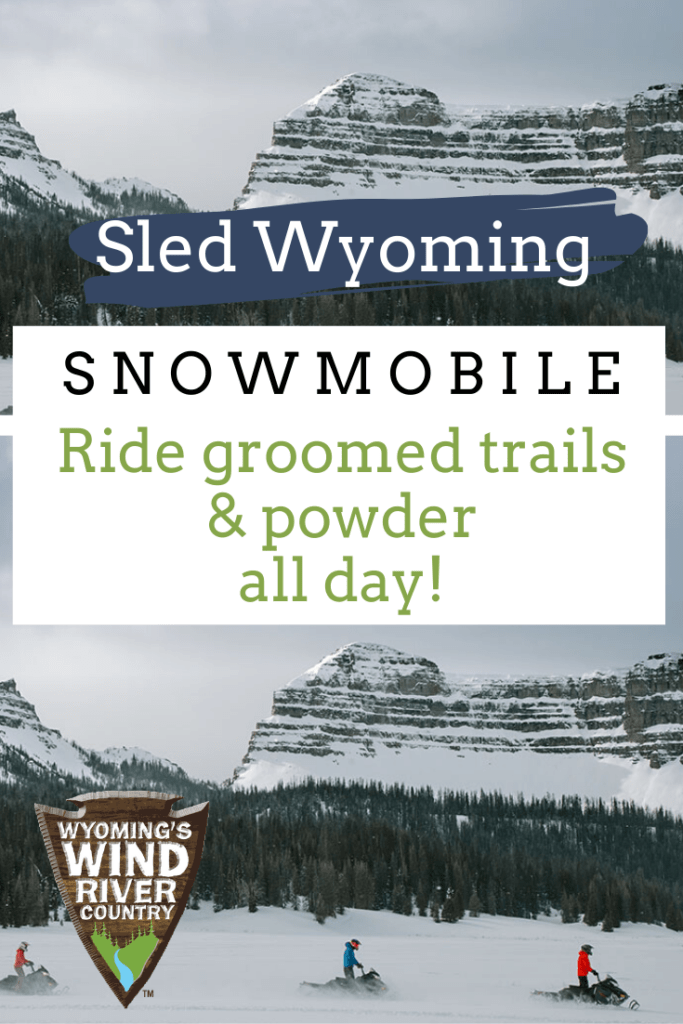Snowmobile in Wind River Country
Wyoming’s Wind River Country has more than 600 miles of groomed trail with solitude, blue skies, mountain vistas and thousands of acres of off-trail riding in virgin powder. Uniquely remote and accessible, the groomed Continental Divide Snowmobile Trail system carves its way below the towering peaks of the Absaroka and Wind River mountain ranges and through some of the most majestic and wildlife-rich terrain in America. Highly visible signs and maps direct the self-guided adventurer through the Shoshone and Bridger-Teton national forests.
Resources
For current snow depth, precipitation and temperature, as well as services along the Continental Divide Trail and much, much more, visit SledWyoming.com.
The Wyoming State Trails Program lists trail information and full size snowmobile maps in pdf format.
You’ll need to purchase a permit, which contributes to the maintenance and grooming of the trail system.
Snowmobiling the Continental Divide Trail System
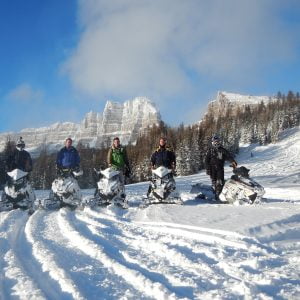
Wind River Country offers over 600 hundred miles of groomed trail, complete with solitude, blue skies, mountain vistas, and thousands of acres to ride off trail in virgin powder. At once remote and accessible, the groomed trail system of the Continental Divide Snowmobile Trail carves its way below the towering peaks of the Absaroka and Wind River Mountain Ranges through some of the most majestic and wildlife-rich terrain in America. Highly visible signs and maps direct the self-guided adventurer through the Shoshone and Bridger-Teton National Forests, and numerous guide services provide insight and planning to smooth your ride.
You can be as rugged or as tame on the machine as you want, and at the end of the day frontier hospitality awaits in the trail-side towns of Wind River Country.
The Continental Divide Snowmobile Trail (CDST) follows the Wind River Mountain Range, spanning 829 miles of trail and thousands of acres of off-trail powder. The trail systems are divided into the northern section and the southern section.
Northern Continental Divide
The northern end of the trail runs from Yellowstone through Togwotee Pass, Dubois, the Upper Green River, and Gros Ventre areas. Just this section encompasses 600 miles of groomed trail wind through the backcountry, under blue skies and overlooking breathtaking mountain vistas. The snow reaches 12 feet deep in a typical season, and the scenery at every turn is spectacular. You’ll frequently spot elk, deer, fox, ermine, and moose traipsing across this already wild and rugged scenery.
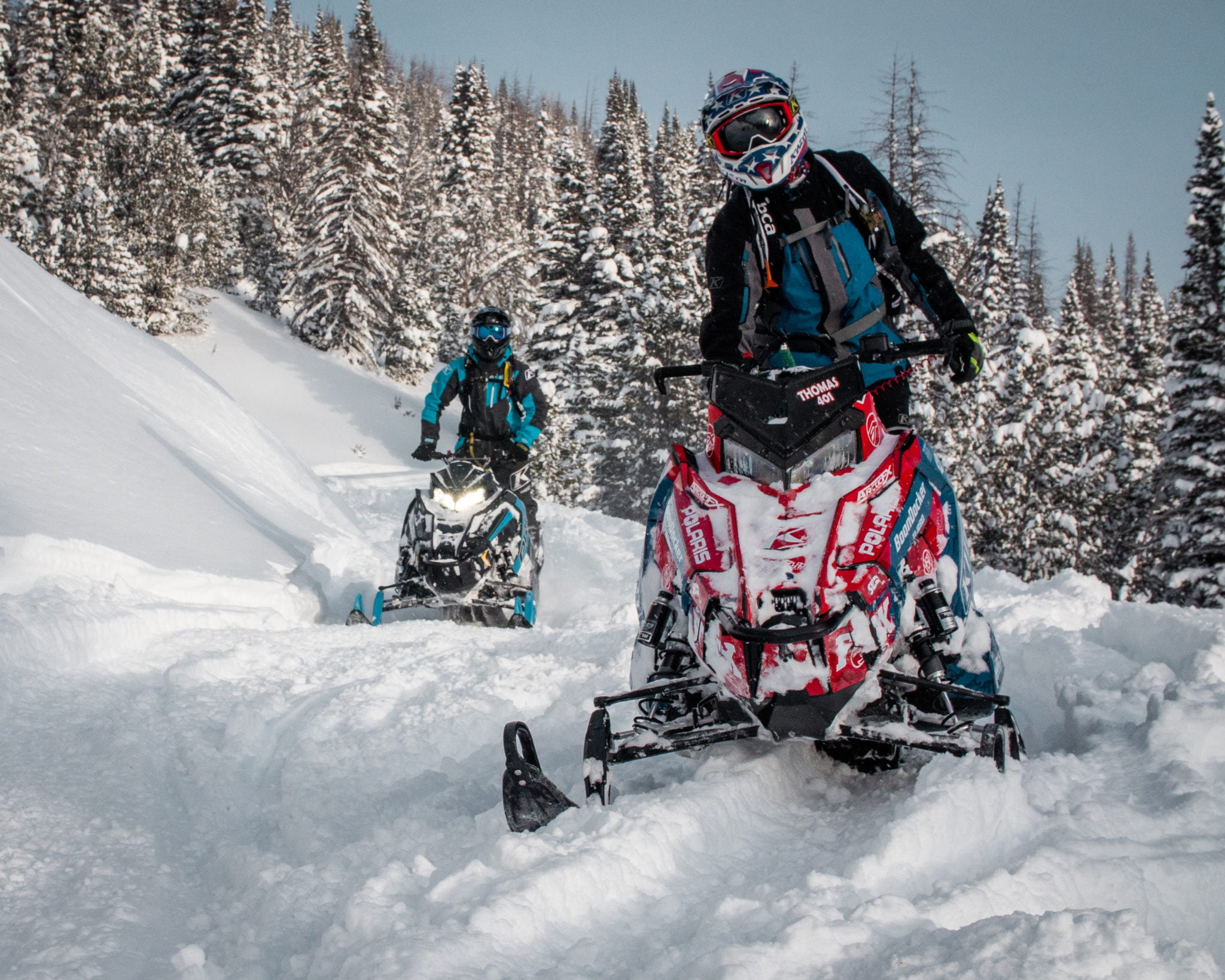
The trail system around Dubois is the ideal gateway to this snowmobiling Shangri-la. Whether you base yourself at one of the trailside lodges on Union Pass, a guest ranch in the Wind River Valley, or a lodge in town, you have easy access to the famously snowy Togwotee Pass area and its three trailheads that access the southern Continental Divide system.
Snowmobile on Union Pass to enjoy a cozy mountain social scene with restaurants, hot tubs, and saloons in short distance. Just 15 miles down the mountain to town, Dubois offers old west charm, more nightlife, and restaurant choices from the upscale steakhouse to hearty café grub.
If a day off the machine is in order, Dubois offers dog sled tours, cross-country ski trails, and the National Bighorn Sheep Interpretive Center, which offers wildlife tours to the famous bighorn sheep herd that winters on Whiskey Mountain.
Southern Continental Divide
Access to the southern end of the Continental Divide Snowmobile Trail lies closer to Lander. From the Sinks Canyon trailhead, climb 3,000 feet in elevation in just 30 miles to find 200 miles of groomed trail. Tracks weave through dense forest and under a canopy of snow-laden pine bows.
At 9,800 feet above sea level, the South Pass trail system opens up into playgrounds of powder with views 150 miles over the Red Desert plains and the Oregon Buttes, a landmark that welcomed weary travelers 150 years ago on the Oregon Trail.
South Pass was the main route over the Continental Divide during the Oregon Trail days and the vestige of a gold mining boomtown remains visible today at Atlantic City. The historic Atlantic City Mercantile and Miner’s Grubstake supply gas and food. And Louis Lake Lodge is rustic and remote, but worth it.
The trail between the South Pass parking area and Irish Canyon is varied, running from groomed to ungroomed tracks as the route traverses the Wind River Mountains.
“Expect high mountains with scenic views,and dense forest trails with snow-covered trees that take riders from one huge open park to another. Visibility up to 30 miles is possible,” the Wyoming State Parks and Cultural Resources Office writes.
Lander is situated just 30 minutes from the South Pass parking area and is one of the larger towns in Wind River Country. Find old and new restaurants, bed and breakfast accommodations, motels, boutique shopping and a thriving year-round music and art scene. Access eight miles of cross country ski trails on South Pass, or head into town and take the kids ice-skating on the regulation hockey rink at the city park.
Whether you ride one-way or base yourself in Dubois, Lander, or Atlantic City, you’ll find an incredible number of sunny days, more snow than you’ve ever imagined, and Rocky Mountain views in every direction. It’s what a winter adventure should be.
Guided Trips
The entire Continental Divide Snowmobile Trail and side trails are clearly marked with orange blazes and four signs at every intersection, and maps are available from the Wyoming Department of State Parks and Cultural Resources. Nonetheless, it’s still an extremely remote region. Considering the tremendous amount of space to explore, a guided trip is well worth the money. Not only do snowmobile guides know the terrain, they’re well equipped and trained for winter travel, avalanche awareness and medical emergencies. You can find skilled local guides at any of the trailhead communities and many lodges have their own on staff.
Tours
3C Guiding
P. O. Box 493
Dubois, WY
Cutthroat Fly Shop & Adventures
202 E. Ramshorn
Dubois, WY
Dubois Fish Hatchery
5 Fish Hatchery Ct.
Dubois, WY
Dubois Museum: Wind River Historical Center
909 W. Ramshorn
Dubois, WY
Eagle Bronze Foundry
130 Poppy St.
Lander, WY
Eastern Shoshone Tribe Buffalo Tours
#14 N. Fork Rd.
Fort Washakie, WY
Equitour, Ltd.
10 Stalnaker St.
Dubois, WY
Fremont County Pioneer Museum
1443 W. Main St.
Lander, WY
National Bighorn Sheep Center
10 Bighorn Ln.
Dubois, WY
Riverton Museum
700 E. Park Ave.
Riverton, WY
South Pass City State Historic Site
125 Main St.
South Pass, WY
Union Pass Rentals
448 Union Pass Rd.
Dubois, WY
Wind River Climbing Guides
P. O. Box 2031
Lander, WY
Wind River Wild Horse Sanctuary
8616 Hwy. 287
Lander, WY
